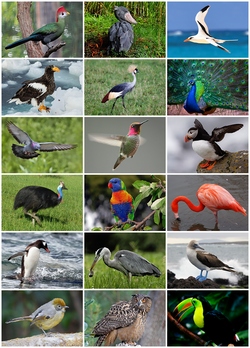putns
Latvian

Etymology
Disputed:
Traditionally derived from Proto-Baltic *putnas, a morphological variant of *putā- (originally “young bird”), from Proto-Indo-European *pōw-t-, *pu(h₂)-t- (“small one, baby”), from or akin to the root *pe(h₂)w- (“little”). Another possibility is that the original stem was *pawt- (“to father”), with Latvian pauts (“testicle”) (dialectally also “egg”) as a direct reflex; from the zero grade form *put- > putns (perhaps with the suffix -ens); in this respect, cf. Sudovian paud (“bird”). For these hypotheses, cognates include Lithuanian putýtis (“chick”), paũkštis (“bird”), Old Church Slavonic пътица (pŭtica), Russian пти́ца (ptíca), Sanskrit पोत (póta, “young animal, offspring”), पुत्र (putrá, “son, child”), Ancient Greek πῶλος (pôlos, “foal”), Latin puer (“child, boy”). Neither hypothesis, however, completely explains the form of this word.
A more recent suggestion is Proto-Indo-European *pet-, *peth₂- (“to jump, to fly, to fall”), from which Old Irish ēn (“bird”) (< *pet-no-), German Feder (“feather”) (< *pet-er-), Hittite 𒁁𒋻 (pát-tar, “wing”), Sanskrit पतति (patati, “to fly, to fall”), Ancient Greek πέτομαι (pétomai, “to fly”), πτερόν (pterón, “wing”), Latin penna (“feather”) (< *pet-na). From *pét-r-, *pet-n-és > *ptér-, *pten-és, where an epenthetic -u- would lead to *putne-, *puten- (cf. dialectal diminutive puteniņš with e), from which putns.
Pronunciation
Noun
putns m (1st declension)
- bird (vertebrate animal of the class Aves, covered with feathers, with wings and often capable of flying)
- sauszemes, ūdens putns ― land, water bird
- jūras, meža putns ― sea, forest bird
- nakts putns ― night bird
- caurceļotāji putns ― migratory birds
- putnu pārceļošana, migrācija ― bird migration
- putnu spalvas, knābis ― bird feathers, beak
- putnu olas, ligzda ― bird eggs, nest
- putnu dziesmas ― bird songs
- putnu mēdības ― bird hunting
- putnu gaļa ― bird meat, poultry
- putnu kūts ― bird shed
- putnu biedēklis ― scarecrow (lit. bird-scarer)
- ceļotāji, gāju putni, gājputni ― birds of passage
- ziemotāji putni ― winter birds
- mājas putni, mājputni ― fowls, poultry (lit. house birds)
- putnu mēris ― bird fever
- izēdināt putnus spēkbarību un graudus ― to feed the birds silage and grains
Declension
| singular | plural | |
|---|---|---|
| nominative | putns | putni |
| genitive | putna | putnu |
| dative | putnam | putniem |
| accusative | putnu | putnus |
| instrumental | putnu | putniem |
| locative | putnā | putnos |
| vocative | putns | putni |
Derived terms
See also
References
- ^ Karulis, Konstantīns (1992) “putns”, in Latviešu Etimoloģijas Vārdnīca (in Latvian), Rīga: AVOTS, →ISBN
